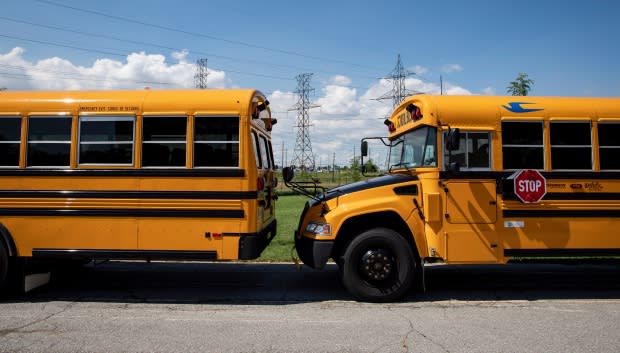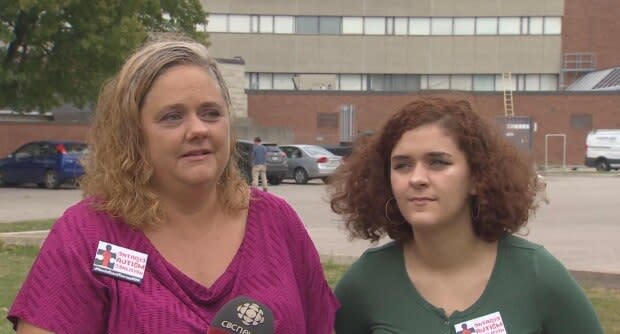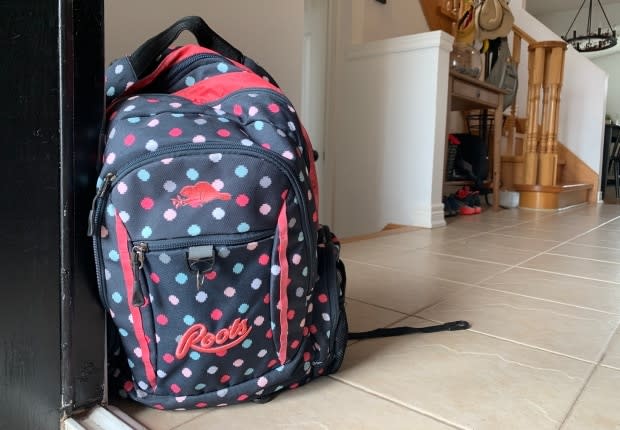Why some parents of kids with disabilities are making the 'heart-breaking' choice of at-home learning
For months, Avery Thornbury, 14, has been looking forward to starting Grade 9 at a new school. In fact, she's been so excited that she's had her backpack ready by her front door since June.
"I just want the virus to be done," she said.
"I just want to go to my school."
But now — at least for the foreseeable future — that's not going to happen.
Avery has epilepsy, so she has to be monitored for seizures. And with her cognitive delays, her mom Lisa Thornbury, says she's working at a Grade 2 level.
Because her daughter has to be constantly monitored, Thornbury has decided to opt for Ontario's online learning option come fall. She says there are holes in the province's back-to-school plan for students with disabilities.

It's a choice she calls "heart-breaking," but ultimately necessary.
"We just thought that the risks outweighed the benefits," Thornbury said.
Survey studies impact of COVID-19 on kids with disabilities
Thornbury says she's spoken to other parents in the same situation who say "they're really nervous, they're afraid and they just don't see that they have any other option."
Parents of children with disabilities have cited issues such as the wearing of masks, questions about transportation for kids who require aid on school buses and the availability of educational assistants to help their kids when they're in the classroom.
On Thursday, Statistics Canada released the results of a survey done in June looking at parents' concerns since the onset of the COVID-19 pandemic.
Those who have kids with disabilities expressed higher levels of concern in all areas, particularly when it came to the school year and academic success for their children.
And what has made that even worse, Thornbury says, is what she calls "confusion" and "frustration" around the province's back-to-school plans for children like Avery.
The plan, which was released on July 31, includes a combination of in-class and at-home learning for high school students, but the province has left room for each school board to tweak its own rules.
The Toronto District School Board (TDSB) is still finalizing plans for children with disabilities, both for online and in class learning, according to Angela Nardi-Addesa, a system superintendent for special education.
Nardi-Addesa says the TDSB is collaborating with other boards to ensure students with disabilities "will not be discriminated against," while remaining aware that some may have trouble with wearing masks and physical distancing.

Thornbury says the Halton District School Board, which oversees Avery's Oakville school, is also still finalizing its plans, leaving "many questions" around transportation, educational assistants, and wearing masks for students with disabilities.
"My daughter can't wear a mask for longer than 15 minutes without being completely frustrated," she said.
But the alternative — sending her to a school where some students aren't required to wear masks — felt too risky, leading her to choose online learning, despite the fact that her daughter thrives at school.
"It's kind of like a lose-lose situation."
Province allocated $22M for special needs, mental health
The province has promised more than $22 million for special needs and mental health, some of which is coming from the federal government.
But despite that funding, Laura Kirby-McIntosh, a mother, teacher and autism advocate, says the Ford government should have released its back-to-school plans earlier.
"Students like my daughter here, who has an exceptionality, they're one in six," Kirby-McIntosh told CBC Toronto Thursday.
"So you have to be planning with these kids in mind from day one — you can't leave it to the last minute."
Her daughter will also be learning online, as her husband is immuno-compromised and is therefore particularly vulnerable to the novel coronavirus.

Kirby-McIntosh is now pushing for more clarity.
"I specifically called the minister of education today to discuss children with special needs," she said.
"We're going to make sure they're able to get in the classroom safely, [and that] they have the same rights as any other child."
Recreating a classroom setting
Meanwhile, Thornbury is now preparing to have Avery at home for longer than originally anticipated, which means "basically home-schooling" and sitting side-by-side with her during her virtual lessons.
In an effort to recreate the classroom setting, the pair also stick to a rigorous schedule, which includes singing O Canada every day, as well as morning announcements, field trips and recess.
"She thrives in a classroom," Thornbury said.

And with the added challenge of also fitting her own work into her schedule, Thornbury said it's going to be hard.
"It's going to be challenging for sure."

